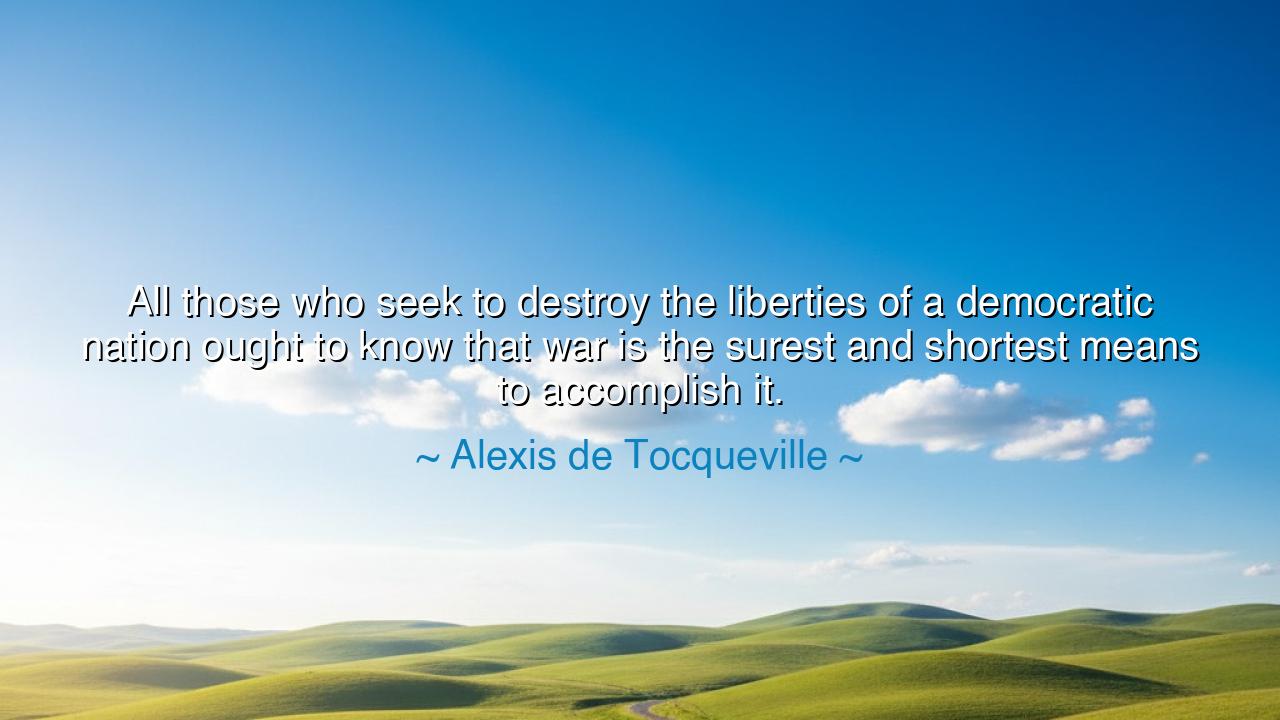
All those who seek to destroy the liberties of a democratic
All those who seek to destroy the liberties of a democratic nation ought to know that war is the surest and shortest means to accomplish it.






The French philosopher and keen observer of nations, Alexis de Tocqueville, spoke with the wisdom of one who had studied both liberty and tyranny when he declared: “All those who seek to destroy the liberties of a democratic nation ought to know that war is the surest and shortest means to accomplish it.” In these words he warned that the greatest danger to freedom does not always come from conspirators within or despots abroad, but from the very chaos of war itself, which demands obedience, silences dissent, and places power into the hands of a few.
The origin of this thought lies in Tocqueville’s Democracy in America, written after his travels in the young United States in the early nineteenth century. He admired democracy’s energy and resilience, yet he also saw its fragility. He knew that war creates urgency, and urgency demands centralized power. In war, leaders ask for trust without question, soldiers march without debate, and citizens surrender liberties in the name of survival. Tocqueville warned that this suspension of freedom, though born of necessity, becomes the very pathway through which liberty can be lost.
History has shown his insight to be true. During the First World War, democratic nations imposed censorship, restricted speech, and detained citizens suspected of disloyalty. In the United States, the Espionage Act of 1917 silenced critics, and those who spoke against the war were imprisoned. Liberty, the very essence of democracy, was curtailed not by overthrow but by the demands of war. Thus Tocqueville’s prophecy was fulfilled: war is indeed the shortest road by which liberty may be destroyed.
The lesson is even starker in the Second World War. The United States, a beacon of democracy, interned over 100,000 Japanese-Americans, stripping them of property, dignity, and freedom, all in the name of national security. While the war was fought for freedom abroad, liberties at home were sacrificed to fear. Tocqueville’s warning resounds here: war arms not only the military but also the state with powers that outlast the conflict, and the people too often accept chains when they are wrapped in the flag.
Yet Tocqueville’s words are not simply despairing—they are also a call to vigilance. He does not say democracy must fall in war, but that it will fall if its people are careless. A free people must fight not only their enemies abroad but also the erosion of freedom within. For it is possible to defend the nation without surrendering its soul; it is possible to wage war while remembering that liberty is the very treasure for which the war is fought.
The deeper wisdom of his statement is that the true enemy of democracy is not only foreign aggression but forgetfulness. If the people forget that liberty is fragile, if they give it up too quickly in times of fear, then they have already accomplished the tyrant’s goal without him lifting a hand. The soldier may hold the line at the front, but the citizen must hold the line at home, guarding the liberties that war threatens to consume.
Therefore, let this wisdom endure: when the drums of war sound, do not surrender the spirit of freedom in your haste to secure the body of the nation. Defend your country, but defend also its liberties, for without them the victory is hollow. Be vigilant of those who ask for too much power in the name of necessity, and remember that it is easy to lose liberty, but hard to regain it. For as Tocqueville taught, war is the swiftest road to the destruction of democracy—unless the people themselves stand guard as its final defenders.






BYBao Yy
I think Tocqueville’s quote is incredibly relevant in the context of modern politics. The idea that war can be used as a tool to destroy democracy is a stark warning about the dangers of unchecked power during times of conflict. It makes me wonder—how much of our freedom are we willing to sacrifice in the name of national security? Are we allowing the erosion of rights under the guise of protecting them?
PCDang Phuong Chi
Tocqueville’s observation is sobering because it suggests that war, while often seen as a means of protecting a nation, can also serve as a vehicle for those who wish to take away democratic freedoms. It’s an uncomfortable thought, but should we be more cautious about the consequences of war on our civil liberties? How do we balance national security with the protection of personal freedoms, especially in the age of modern conflicts?
NLThanh Thao Nguyen Le
This quote is striking because it underscores how war can be exploited to undermine democratic freedoms. It raises an important question: how often do we allow national security fears to justify limiting civil liberties? Could the erosion of freedoms in the name of war be something we’re currently witnessing? In times of crisis, do we sacrifice too much of our democracy in the name of safety, without even realizing the consequences?
HHNguyen Huu Hieu
Tocqueville’s quote really highlights the dangerous link between war and the erosion of liberties. The idea that war is a tool for those who wish to destroy a democracy’s freedoms is chilling. It makes me think: are we seeing this happen today in various parts of the world? Does the constant threat of war make it easier for governments to suppress dissent and justify actions that limit freedoms? It’s something to consider when evaluating current political climates.